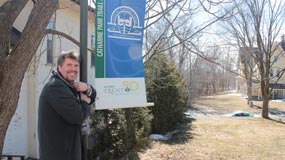
Principal of Traill College and Director of Continuing Education, Dr. Michael Eamon, never limited his interest to just one field. The latest addition to his pool of multifaceted talents is the title of ‘author’ as he publishes his first book entitled Imprinting Britain: Newspapers, Sociability and the Shaping of British North America. The book, which was published by McGill-Queen’s University Press, became available on 1 April 2015, and it it is to be officially launched on May 24.
Arthur reporter Ugyen Wangmo talks with the new author to get an insight on his latest muse.

What is Imprinting Britain: Newspapers, Sociability and the Shaping of British North America about?
It is about the origins of domestically-produced, English-language newspapers in what we now consider Canada. The opening of the first printing presses proved to be a catalyst for economic and social growth. Presses were seen as inherently progressive. Printers saw themselves as agents of modernity on the frontier. Newspaper readers wanted to be connected into larger commercial and literary currents. Being apprised of the latest trends gave one the air of refinement and success. Print was a medium of sociability. It was also used as means to inform sociability in spaces such as theatres, coffee houses, and societies. The book looks both at newspapers and these other physical spaces of sociability. In particular, I argue that an English-language colonial print community emerged in the mid-eighteenth century.
What inspired you to write this?
Like all scholarly works in history, the sources shaped the final nature of the book. Originally, I had wanted to look at the contributions of Scottish-trained physicians on the intellectual life of the British North American colonies. However, I realized there were strong social and intellectual networks in place in the colonies that these physicians were already plugging into. Further research demonstrated that the press, and in particular the colonial newspaper, were the nodal points in which these networks intersected.
How did you decide on the title?
Imprinting Britain has a purposeful double meaning. Early newspapers were called ‘imprints’ and the early printers in Canada were literally imprinting stories from, about, or inspired by Great Britain. However, a larger social effect also occurred where the philosophies, literary touch stones, political ideals, and social graces of Britain were also deemed desirable and ‘imprinted’ upon the new colonies.
What did you most enjoy about the process?
I enjoyed the research that took me to various exotic places. However, I also really enjoyed the writing, and telling the stories of print and its early readers in British North America.
What were the challenges?
To balance work with family was difficult, especially when I had to leave my two little boys with my wife while I was away on research trips.
The scope of the work was also challenging. The history of this time period in Canada is very regional. It meant that I had to master both the literature on early Quebec (in both French and English) and that of Nova Scotia, Colonial America, print and publics, as well as the transatlantic world. There were a lot of different interpretive threads that required me to pull together.
What did you learn from writing this book?
I learned that social networks were just as important 200 years ago as they are today. While we rely on electronic social media, in early Canada the newspaper medium was essential. Members of the colonial print community used the newspaper to advance socially.
Who is the intended audience? And why should they read it?
I think anyone who is a journalist or interested in the history of journalism will like this book. Students of Canadian history (and particularly the history of Quebec and the Maritimes) will like this book as well as those who like the era of Revolutionary America.
What is the message of the book that you want your readers to comprehend?
Two hundred years ago an English-language, colonial print community emerged around the presses of Halifax and Quebec City. Print stories offered colonists a larger perspective on the world and stability in an ever-changing colonial climate. Newspapers informed commerce and culture of a class of colonists desperate to succeed. The literary, scientific, and commercial stories found in early print helped form the early socio-cultural foundations of Canada.
How do you balance your time, between teaching and writing?
Finding a balance between teaching, writing, and being a college principal has been difficult. There have been many times when I wondered how I could get everything done. However, I think in an institution of higher education that it is important to engage in all of those pursuits. Any success I realize as a teacher, a writer, or as and an administrator is interrelated; each informs the other.
When did you first decide to be a writer, and how?
When I decided to become a professional historian I decided to be a writer, as you can’t be an historian that doesn’t write. Although this is my first book, I have written half-a-dozen scholarly articles, a dozen or so popular articles, and have helped developed the text for almost two dozen historical websites, plaques, and exhibitions.
An excerpt from the book to catch the eye of readers?
“In the beginning was the spoken word. The Indigenous peoples who lived in the regions that would become British North America participated in large networks of trade, commerce, and communication without a written language in the European sense. With the arrival of Europeans came a new literacy and the printed word…”

